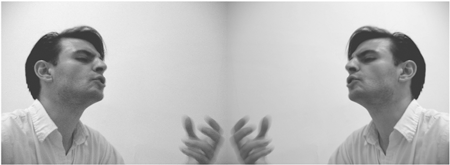By Rachel Fershleiser
What do you get when you bring together a Christian theologian, an atheist logician, and a misunderstood psychologist who’s been dead for eighty years?
If you’re artist Pablo Helguera, what you get is an opera. Or an opera of sorts, anyway: his latest work, “The Foreign Legion,” combines Puccini-esque music with historical biography, panel discussions, even ventriloquism. The performance piece is being co-presented by the Lower Manhattan Cultural Council and Gigantic Art Space for PERFORMA 05, the first biennial of performance art in New York. It’s also part of The Imaginary Forum of Mental Sculpture, an annual public program designed to bridge the interstice between interpretive discussion and art.
Helguera, who was born in Mexico in 1971, comes from a family of classical musicians. While he considers himself a visual artist, he has a background in opera and is quick to acknowledge the musical and literary dimensions in most of his work.
“I’m interested in the lyric aspect of opera,” he said. “It allows you to be dramatic and over the top. Performance art can be very restrained; in opera you scream and cry and yell and die.”
Another format that interests Helguera is the panel discussion. In his former career at the public programs department of the Guggenheim Museum, he helped to coordinate over five hundred panels, and became fascinated by their performative nature. He began experimenting with scripted panel discussions populated by actors, instead of real experts speaking off the cuff.
“The Foreign Legion” brings together these two seemingly disparate forms together, making the panel discussion a part of the work, rather than merely a reaction to it. The result is a one-act opera uniquely juxtaposed with live art criticism.
“I normally make works where you don’t know what’s fiction and what’s reality,” Helguera said, adding that while theatre creates a fictional space, performance art is about real people making things in that moment. “I like to mix the two worlds,” he said.
The opera portion tells the story of Swiss psychologist Hermann Rorschach, best known for his inkblot-based Rorschach test, wherein subjects attribute meaning to a non-representative splotch. The viewers’ wildly different reactions to this abstract form on a card dovetails nicely with the art critics represented on Helguera’s panels, who reveal their own concerns and biases as they analyze this abstract performance.
Helguera says he was drawn to Rorschach because he was something of a tragic figure, having died too young and too unappreciated in his own time. It’s not the first time Helguera has mined the real lives of obscure historical characters. “Parallel Lives,” a recent work at MoMA, was based on the true experiences of five little-known but remarkable people.
“I love people’s stories. I love their lives,” he states simply. History fascinates Helguera in much the same way as his other themes do: it is neither truth nor fiction. He describes biography as a “literary genre” and he revels in the impossibility of defining exactly what has happened in the past.
In fact, it is uncertainty itself Helguera explores in “The Foreign Legion,” and he says the downtown Manhattan location is central to his thought process.
“Historical, tragic events mark this place. What do we believe in now, after all we’ve been through? Questions I try to raise here have to do with the process of renovation—the literal and figurative renovation we’re going through. How do we move forward?”
For information on tickets to “The Foreign Legion,” visit www.giganticartspace.com/gas-station or call 212-226-6762.
google_ad_client = “pub-6226499064891091”;
google_ad_width = 468;
google_ad_height = 60;
google_ad_format = “468x60_as”;
google_ad_channel =”0606561524″;
google_color_border = “336699”;
google_color_bg = “FFFFFF”;
google_color_link = “0000FF”;
google_color_url = “008000”;
google_color_text = “000000”;
//–>
src=”https://pagead2.googlesyndication.com/pagead/show_ads.js”>
WWW Downtown Express



































